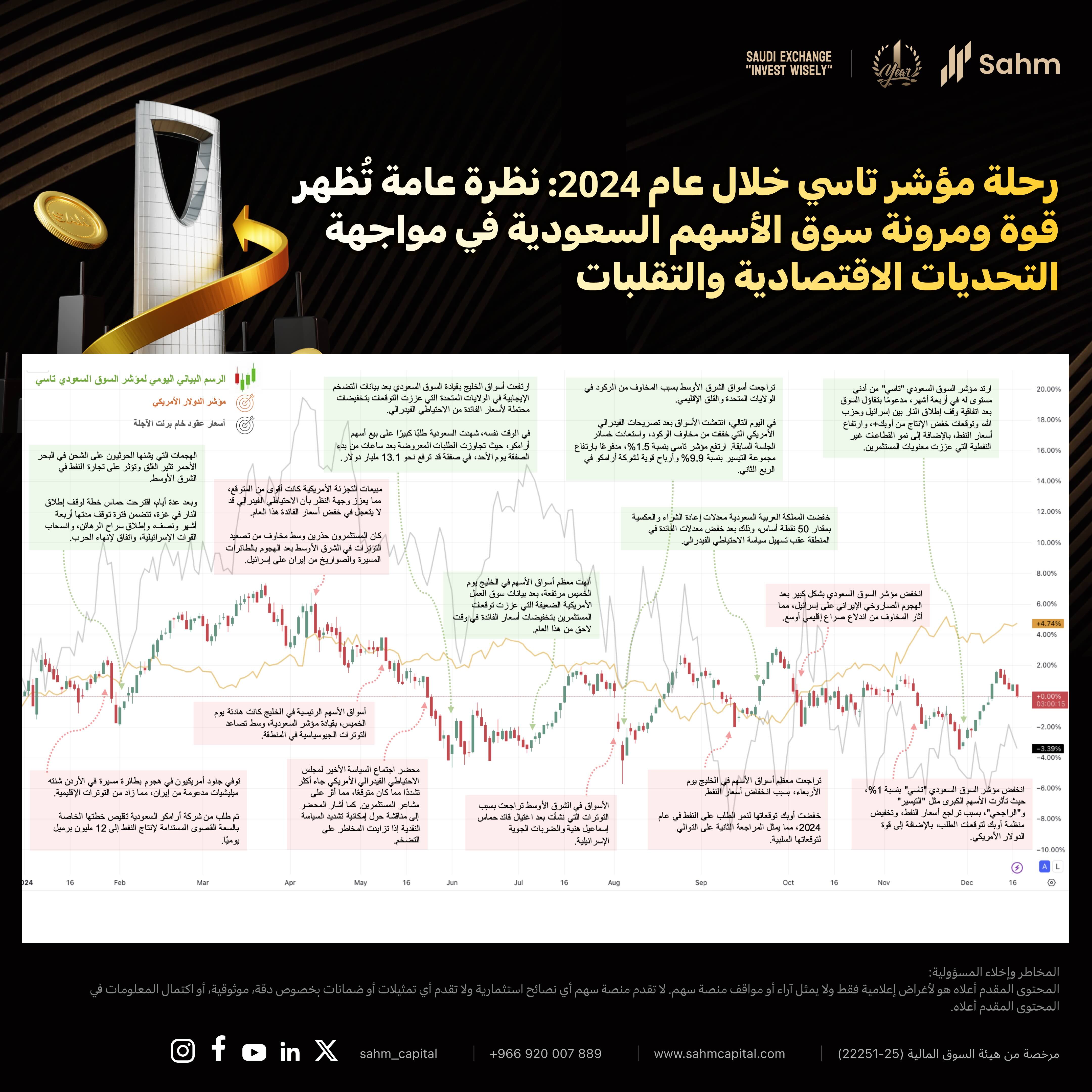TASI's Journey Through 2024: A Visual Look at the Resilience of Saudi’s TASI Index
SAUDI ARAMCO 2222.SA | 28.50 | -1.72% |
TALCO 4143.SA | 53.70 | 0.00% |
ALBAHA 4130.SA | 0.44 | Delist |
TAMKEEN 1835.SA | 66.70 | +2.14% |
BURGERIZZR 6016.SA | 20.56 | -0.19% |
As we approach the end of 2024, it is a good time to reflect on the significant events that have shaped the performance of the Saudi stock market, particularly the Tadawul All Shares Index(TASI.SA).
This year has been marked by a series of impactful moments in the region that have influenced market sentiment and investor confidence. Despite external challenges, the resilience of the Saudi market has been evident, with key factors contributing to fluctuations in performance that have shaped the market's overall trajectory. Let us take a moment to review the events that have influenced our market and how they have contributed to shaping the current investment landscape in Saudi Arabia.

Note: All news and event reports are sourced from Reuters; All market data is as of December 17, 2024
Early-Year Tensions: U.S. Military Casualties and Oil Production Cuts
At the start of the year, rising tensions in the Middle East were underscored by U.S. military deaths occurred due to a drone attack in Jordan by Iran-backed militants. This escalated concerns over regional instability. Adding to the uncertainty, Saudi Arabian Oil Co.(2222.SA) was asked to reduce its planned maximum sustainable oil production capacity to 12 million barrels per day, signaling a shift in energy market dynamics and potential supply constraints.
February: Geopolitical Uncertainty and Diplomatic Moves
In early February, concerns over Houthi attacks on shipping in the Red Sea further heightened tensions in the region. These fears of disruption to vital oil trade routes contributed to a surge in oil prices. Shortly after, Hamas proposed a ceasefire plan for Gaza, calling for a four-and-a-half-month pause in hostilities, the release of hostages, Israeli troop withdrawals, and a war-ending agreement. This diplomatic initiative helped to stabilize regional tensions and improved investor sentiment. As a result, market risk appetite increased, which played a significant role in the subsequent rebound of regional securities markets, including Tadawul All Shares Index(TASI.SA).
April: Potential Fed Rate Hold and Middle East Escalation Concerns
In April, stronger-than-expected U.S. retail sales data boosted investor expectations that the Federal Reserve would refrain from cutting interest rates in the near term. Moreover, concerns over further escalation in the Middle East, especially following an Iranian drone and missile strike on Israel, kept many investors cautious. The combination of these factors created a tense environment for markets, with many investors opting for a wait-and-see approach.
May: Market Caution Amid Rising Geopolitical Tensions
The beginning of May saw subdued stock market performance across the Gulf, with the Saudi market leading the decline. Geopolitical tensions were again at the forefront, affecting investor confidence and pushing markets lower.
Later in May, minutes from the U.S. Federal Reserve's latest policy meeting added to the market's anxiety, revealing a more hawkish stance than expected. The discussion of potential tightening should inflation risks materialize dampened investor sentiment, further heightening concerns about future economic conditions.
June: Gulf Markets React to U.S. Inflation Data and Aramco's Share Sale
By early June, Gulf stock markets, led by the Saudi index, experienced a rebound, driven by positive U.S. inflation data. This fueled investor hopes of potential interest rate cuts by the Federal Reserve. In parallel, Saudi Arabia saw significant interest in its sale of shares in Saudi Arabian Oil Co.(2222.SA), with the offering attracting more demand than the stock on offer within hours of launch.
July: Soft U.S. Labor Market Data Boosts Investor Sentiment
As July unfolded, most Gulf markets saw upward movement, with positive sentiment largely driven by softer-than-expected U.S. labor market data. This report led investors to believe that the Federal Reserve might ease interest rates later in the year, providing a boost to regional markets, including Tadawul All Shares Index(TASI.SA).
August: Tensions Flare and Markets Rebound
August was a particularly volatile month for Middle Eastern markets, starting with a sharp drop due to heightened tensions following the assassination of Hamas leader Ismail Haniyeh and Israeli military strikes. The situation was compounded by concerns over a potential U.S. recession and the broader regional conflict. However, markets rebounded quickly as comments from the Federal Reserve alleviated recession fears. TASI gained 1.5%, bolstered by a 9.9% surge in Al Taiseer Group Talco Industrial Co.(4143.SA)'s stock and a robust Q2 earnings beat from Saudi Arabian Oil Co.(2222.SA).
September: Oil Prices Weigh on Gulf Markets
In mid-September, the Gulf stock markets experienced a downward trajectory, primarily due to weaker oil prices. This coincided with OPEC’s downward revision of its 2024 oil demand growth forecast, signaling challenges for the energy sector. This marked the second consecutive revision, which added to investor concerns about the future outlook for oil prices.
Later in the month, Saudi Arabia responded to regional rate cuts following the Fed’s policy easing, reducing its Repo and reverse Repo rates by 50 basis points. This move aimed to support the economy and provide some stability to the financial markets.
October: Escalating Conflict and Market Reactions
In October, the Saudi stock market saw a significant downturn, primarily driven by fears of a wider regional conflict after Iran’s ballistic missile strike on Israel. This event exacerbated fears of further escalation in the Middle East, leading to cautious trading behavior among investors.
November: Weak Oil Prices and Market Volatility
By mid-November, TASI had fallen by 1%, dragged down by weak oil prices and ongoing concerns over OPEC’s downgraded demand forecast, coupled with the strength of the U.S. dollar. Stocks like Al Taiseer Group Talco Industrial Co.(4143.SA) and Al Rajhi Bank(1120.SA) were particularly affected, reflecting the broader market’s struggles.
December: A Positive Rebound
In early December, TASI experienced a strong rebound from a four-month low, fueled by a combination of factors. The Israel-Hezbollah ceasefire deal, expectations of OPEC+ production cuts, rising oil prices, and growth in non-oil sectors all contributed to a more optimistic market sentiment. This resurgence provided a much-needed boost to investor confidence, marking a positive end to a turbulent year.



